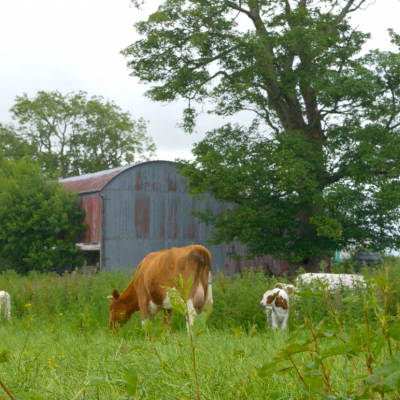Animal welfare is prioritised with a small herd of native Ayrshire cows and calves staying together, roaming freely, grazing at will on grass and protein-rich herbal leys and displaying normal behaviour in small, social groups. Rotational grazing boosts soil fertility, attracting precious insect and bird life. Breeding lapwings have returned to the farm for the first time in years. This is farming in tandem with nature with fewer animals and inputs, as called for in our Better by Half roadmap.
Multi-award winning dairy farmer, Bryce Cunningham, has been on a journey over the last eight years, transitioning Mossgiel from an intensive system to one which is organic and certified by Eating Better members, Pasture for Life and The Soil Association. The small herd of 45 Ayrshire cows are milked once a day and the calves stay with their mums, being weaned at 4 months, when they start eating grass and the herbal leys. The focus is on the quality of the milk, not yield.
On his vision of dairy farming, Bryce said:
“What we’re looking to do is show that with a few cows, operating a cow-with-calf system there is no need for any cereals or fertiliser, it’s all grass-fed and we charge for a premium product. We are now a platform for a cooperative that includes five other Scottish Organic farms, who truly want to make a change at soil level. We act as the bridge between the farming families and our buying supporters, handling the pasteurisation, processing, bottling and delivery in electric vehicles. Our vision is to make dairy farming sustainable again, the way it was forty years ago.”
Demand is growing for Mossgiel milk. Last year it won a landmark contract to supply the local authority, East Ayrshire, with organic milk to all its forty primary schools, a first for a council. The milk is delivered to schools in electric vans and transferred to purpose-built vending machines. Pupils have reusable beakers to fill with the fresh, organic milk from a few fields away, connecting communities to the land on which the milk was produced. This is dynamic procurement, creating a new route to market for locally produced food, reducing food waste and carbon emissions and supporting the local economy, while being competitive on cost, as outlined in our Better By Half asks for public procurement.
East Ayrshire is the longest-standing Food for Life Served Here gold award holder in the UK, chalking up fourteen years. Of its seven suppliers, five are local, two of which are organic certified - Mossgiel and Locavore, half an hour away in Glasgow.
Mark Hunter, Strategic Food Lead at East Ayrshire council said:
“We realise what it is to use organic: the better welfare standards for the animals, the education that we give within the schools about those welfare standards and the reduction in food miles for the local authority. And the whole focus on climate change and the climate declaration, which East Ayrshire has made. Going forward through the Food for Life and the Soil Association, we want to see support for farmers to change the way they farm and for local authorities to look at what they have on their doorsteps and offer a route to market.”
Local areas and public sector organisations, having declared a climate emergency, can take bold action to serve more sustainable food, as outlined in our ‘Serving Better’ guide.
Bryce Cunningham said:
“We have small children in our family who go to a local school, but they weren’t drinking local milk. When they looked out of the classroom window they were seeing cows in the field, but they weren’t drinking the milk that came from those farms. It was our passion to get that local milk into local schools. Working with East Ayrshire in this way has been fantastic for us. We have electric vehicles, we have a zero waste policy for all packaging and all of the organic milk we use comes from South West Scotland, particularly Ayrshire. Other dairies have a very high cost of getting milk to schools, but the way we operate allows us to be competitive and we won the contract.”
Eating Better’s executive director, Simon Billing said:
“Our vision is about normalising sustainable food in public procurement. East Ayrshire is a beacon of sustainability. It’s supporting the very best local producers and connecting them with local people and local schools. We want all local authorities to be supporting farms like Mossgiel, which are delivering better - better for animal welfare, better for nature and better for the environment.”
Watch the film here.
